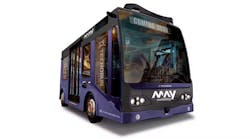RIDOT begins AV demonstration project
Rhode Island Department of Transportation (RIDOT) officials hosted a demonstration of autonomous vehicle technology ahead of a pilot project scheduled to begin this spring in Providence.
"This is a very exciting day as we kick-off testing of autonomous vehicles, putting Rhode Island on the map as a leader in this new high-tech field in transportation," Rhode Island Gov. Gina Raimondo said. "And we'll do it in a careful and safe manner partnering with institutions of higher education to carefully study and evaluate the service and its integration on Rhode Island roads."
The autonomous shuttle, known as Little Roady, was developed by May Mobility, Inc., and will be tested on low-volume roads in Quonset Business Park as an initial phase to the pilot project.
The Little Roady Pilot Project will operate on low-speed roadways along the Woonasquatucket River Corridor, which lacks transit service, in Providence this spring. Each vehicle is fully electric and capable of carrying five passengers, as well as an attendant who is trained how to operate the vehicle manually if needed. Up to six vehicles will along the 5-mile route with 12 stops at the same time.
RIDOT and May Mobility entered into a public-private partnership for the program, which calls for RIDOT to contribute $800,000 for the first year of operation. This includes $300,000 of 100 percent federal research funds through the Federal Highway Administration and a $500,000 grant awarded by the R.I. Attorney General's Office as part of a settlement with Volkswagen. RIDOT says its contract with May Mobility includes options to extend the service for an additional two years.
The debut of the autonomous vehicles is the latest step in a multi-agency effort called the Rhode Island Transportation Innovation Partnership (TRIP), which RIDOT launched in 2017. TRIP also includes a research component, with the goal of studying autonomous mobility solutions, ridership, workforce impacts, environmental impacts, and technology adoption, among others.
The research being conducted in this pilot project will help the RIDOT better understand the opportunities and challenges that come with integrating this new technology onto Rhode Island roads. The research will help improve transit and provide information for communities, the workforce and policymakers.
"This project gives us the opportunity to gain first-hand experience with this new technology and that information will be invaluable when we look ahead to the impact that autonomous vehicles will have on public transportation in the future," said Scott Avedisian, CEO of the Rhode Island Public Transit Authority (RIPTA). "Having some of our bus operators ride the shuttle routes is also going to allow them to share important feedback on the role of on-board personnel and passenger needs."
The testing period in Quonset will be followed by similar testing in Providence, prior to the start of service. This includes testing of the vehicles and all their sensors and a rigorous acceptance testing protocol in which the vehicles must pass several safety tests including adhering to lanes, avoiding obstacles and safe operations in both daytime and nighttime conditions, as well as in different types of adverse weather. Between the two locations, the fleet will undergo 500 miles of testing.
RIDOT and May will develop a public education campaign featuring signs along the route and a website as the launch of the service draws nearer.

Mischa Wanek-Libman | Group Editorial Director
Mischa Wanek-Libman is director of communications with Transdev North America. She has more than 20 years of experience working in the transportation industry covering construction projects, engineering challenges, transit and rail operations and best practices.
Wanek-Libman has held top editorial positions at freight rail and public transportation business-to-business publications including as editor-in-chief and editorial director of Mass Transit from 2018-2024. She has been recognized for editorial excellence through her individual work, as well as for collaborative content.
She is an active member of the American Public Transportation Association's Marketing and Communications Committee and served 14 years as a Board Observer on the National Railroad Construction and Maintenance Association (NRC) Board of Directors.
She is a graduate of Drake University in Des Moines, Iowa, where she earned a Bachelor of Arts degree in Journalism and Mass Communication.



